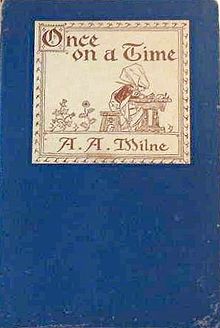- Once on a Time
-
 1st edition (publ. Hodder & Stoughton)
1st edition (publ. Hodder & Stoughton)
Once On A Time is a fairy tale created by A. A. Milne (creator of Winnie-the-Pooh).
Written in 1917, Milne's own introduction begins 'This is an odd book', and indeed it is very difficult to classify. Ostensibly a typical fairytale, it tells the story of the war between the kingdoms of Euralia and Barodia and the political shenanigans which take place in Euralia in the king's absence, all supposedly rewritten by Milne from the writings of the fictional historian "Roger Scurvilegs".
Milne created the story to contain believable, three-dimensional characters, rather than the stereotypes which will satisfy children. Hence the book introduces us to a princess who is far from helpless; a prince who, whilst handsome, is also pompous and vain; an enchantment which is almost entirely humorous; a villain who is not entirely villainous and receives no real comeuppance; a good king who isn't always good; an evil king who isn't always evil, and so on. The result is a book which children may not enjoy as much as adults.
The book was written by Milne partly for his wife, upon whom the character of the Countess Belvane was partially based.
Contents
Plot summary
When the King of Barodia receives a pair of seven-league boots as a birthday present, his habit of flying over the King of Euralia's castle during breakfast provokes a series of incidents which escalate into war. While the King of Euralia is away, his daughter Hyacinth tries to rule in his stead and counter the machiavellian ambitions of the king's favourite, the Countess Belvane.
Characters
King Merriwig of Euralia: fat, jolly if occasionally pompous and easily-led. He nevertheless can show great strength of mind, as related in an anecdote in which he outwitted a fairy, mostly by sheer stubbornness.
Princess Hyacinth: Merriwig's daughter. Rather more savvy than her father, she is nevertheless at first out of her depth when trying to rule the kingdom in his absence. Despite this, she grows into the role.
The King of Barodia: Bombastic, proud and arrogant, and takes inordinate pride in his moustache.
The Countess Belvane: A difficult character. Beautiful, proud and haughty, she is inclined to melodramatics and emotional self-indulgence. Ostensibly the villain of the piece, her motives are complex and subtle.
Wiggs: Hyacinth's closest friend; helpful and dreamy.
Woggs: A palace servant; well-meaning but terribly dim.
Prince Udo of Araby: Prince of a neighbouring realm, invited by Hyacinth to help her in her troubles with Belvane. He turns out to be very little help at all, partly due to suffering an embarrassing enchanment, but mostly due to his personality.
Coronel: Udo's companion-at-arms and best friend. Far more laid-back and likeable than the prince.
Roger Scurvilegs: Noted historian of Euralia, author of the monumental work Euralia Past and Present. The narrator gives him credit for the basic facts of the story whilst gently lampooning him for his stuffiness.
Themes and issues
Milne himself resisted characterising the book. In his foreword to the 1922 edition he wrote of it:
"For whom, then, is the book intended? That is the trouble. Unless I can say, "For those, young or old, who like the things which I like," I find it difficult to answer. Is it a children's book? Well, what do we mean by that? Is The Wind in the Willows a children's book? Is Alice in Wonderland? Is Treasure Island? These are masterpieces which we read with pleasure as children, but with how much more pleasure when we are grown-up. In any case, what do we mean by "children"? A boy of three, a girl of six, a boy of ten, a girl of fourteen - are they all to like the same thing? And is a book "suitable for a boy of twelve" any more likely to please a boy of twelve than a modern novel is likely to please a man of thirty-seven; even if the novel be described truly as "suitable for a man of thirty-seven"? I confess that I cannot grapple with these difficult problems. But I am very sure of this: that no one can write a book which children will like, unless he write it for himself first. That being so, I shall say boldly that this is a story for grown-ups. [...] But, as you see, I am still finding it difficult to explain just what sort of book it is. Perhaps no explanation is necessary. Read in it what you like; read it to whomever you like; be of what age you like; it can only fall into one of the two classes. Either you will enjoy it, or you won't.
"It is that sort of book.[1]".
Notes
- ^ Milne, A.A.: "Once On A Time" pp vi-viii, 1922 US ed. published by Grosset & Dunlap (New York)
External links
Categories:- Fairy tales
- 1917 books
- Novels by A. A. Milne
Wikimedia Foundation. 2010.
